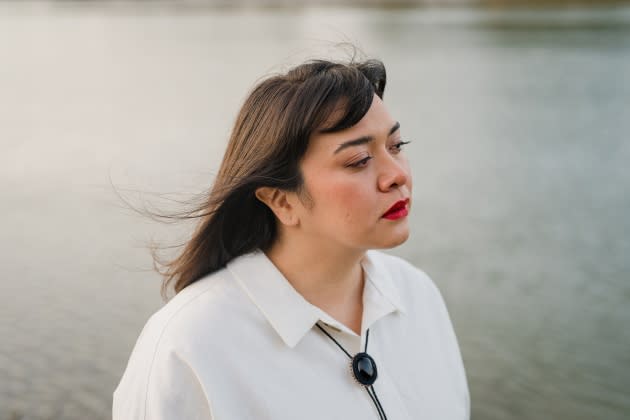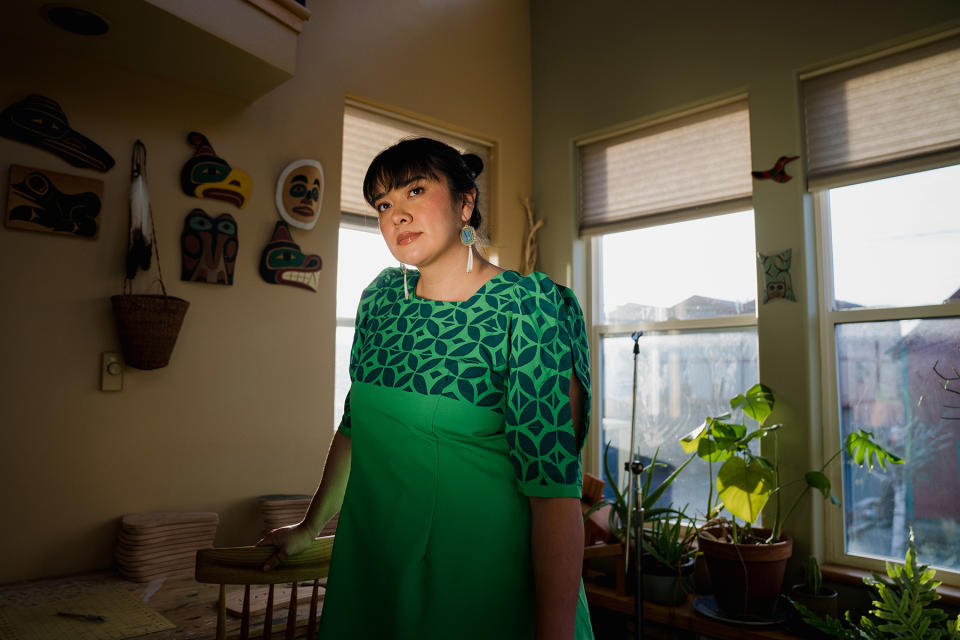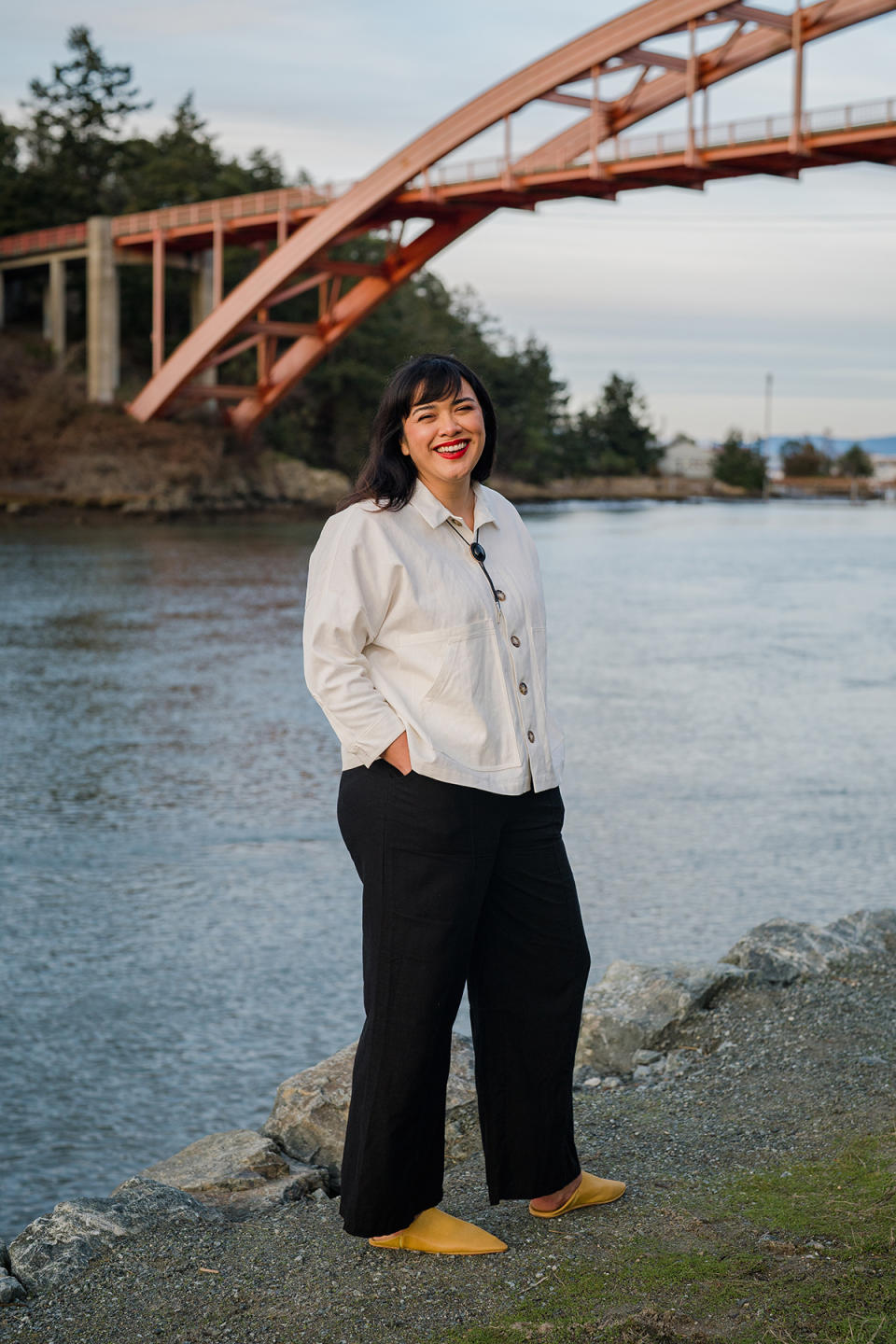Black Belt Eagle Scout on the Power a Place Can Have
- Oops!Something went wrong.Please try again later.
- Oops!Something went wrong.Please try again later.

When Katherine Paul thinks back to the experiences that inspired her sweeping new album, she thinks about Sčičudᶻ, a forested path near the Salish Sea, and the salmon berries that grow there.
Salmon berries, for those who live outside of the Pacific Northwest, are sweet, tart fruits resembling blackberries or raspberries. Their name comes from their color — shades of pink or a deep red — and they’re hard to get outside of their natural habitat, as they are fragile and spoil quickly.
The singer-songwriter and multi-instrumentalist, who goes by KP and performs as Black Belt Eagle Scout, would often take hikes along Sčičudᶻ, witnessing the seasons change.
More from Rolling Stone
“That place is really special to me,” says KP, 33. “I would go there a lot during the last two, three years, to hang out and to witness what was going on. There’s a lot of things going on there.”
She recorded her new album, The Land, the Water, the Sky, at a studio in Anacortes, Washington, about 10 miles north of that path. But she wrote the album at various places like Sčičudᶻ, bringing a guitar along to strum chords and “feel what was around me.”
“I’m sorry I’m being a little bit of a nerd,” she says with a laugh. “But when I was saying there’s a lot that goes on, it’s like… You watch the salmon berries grow.”
As may be obvious from the title, The Land, the Water, the Sky is an incredibly grounded album, steeped heavily in the locale in which KP wrote it. She grew up in the Swinomish Indian Tribal Community, in the same area from which she took my call. More than a decade ago, she moved to Portland, Oregon, where she stayed for years, attending Lewis & Clark College and working at the Rock ‘n’ Roll Camp for Girls. But as the pandemic set in, KP found she couldn’t stay away from home for much longer.
“This album is a lot about the journey back home,” she says. “Moving back, and then figuring out who I am and this new phase of being an adult in my homelands.”
She got a job at a nonprofit, Potlatch Fund, that let her work remote. Ultimately, she says, the decision to move back to Swinomish was due to a combination of factors that compounded during the pandemic. Her parents were experiencing health issues that required extra care, and she wanted to move in with her partner and his children.
“If we’re going to experience this shift in life, these different rules of having to live under, let’s go someplace where there’s more freedom in being able to move throughout nature,” she says. “You know, be close to our family and our community.”

As important as community is to KP, her music often has a feeling of isolation. On “Understanding” (a song on which she performs every instrument), she sings, “I know it’s wrong to love everyone but myself, but sometimes I can’t even hold me/Sometimes I can’t even find time for myself.”
It’s not unusual to find a Black Belt Eagle Scout song that evokes a sense of a grander connection, but also hints at a deeper longing. On “Soft Stud,” a single from her 2018 debut album, she recites the phrase “Need you, want you, I know you’re taken” over churning, gritty power chords and a glitzy synth, and a blistering guitar solo to close it out.
That song’s aching, angsty lyrics made it a perfect fit for Reservation Dogs, the hit FX series about four Native teens attempting to make their way from their Oklahoma rez to California. “Soft Stud” was featured in the latest season of the show, along with a new track from the latest Black Belt Eagle Scout album called “Salmon Stinta,” which played in a pivotal sequence in the season finale.
“I didn’t know that that song was gonna be in such an emotional scene,” KP says. “And when I saw it, I just fucking bawled my eyes out. I was just crying.” She recalls a text she sent to co-creator and showrunner Sterlin Harjo: “I was like, ‘Sterlin, thank you so much. This is awesome.’”
Part of what makes that series special to KP, and so many Indigenous people, is the way it allows them to feel seen in the media they take in. KP came up in the still-thriving riot grrrl movement of the Pacific Northwest in the 2000s, but lately she’s been reconsidering that time. It was a subculture largely composed of white musicians, and she wishes she’d had more bands like Weedrat, a Diné punk group.
“Obviously, being a woman and being queer, seeing women who are also queer playing music, it’s inspirational and you feel that you’re seen,” KP says. “But it was missing this indigenous element… I think it’s OK to question things and to grow. And I think it’s OK to change your mind.”
Feeling like part of a community is of the utmost importance to KP, whether it’s a scene, a people, or where you were born. And maybe to some, where you’re from can feel like happenstance — a matter of fact. But for KP, it’s hard to imagine herself living anywhere else. She describes the Skagit Bay area as feeling like medicine for her. “It almost sort of seems wrong to not live here,” she says. She’s as inseparable from the region as the salmon berries she sees grow.

One time, she recalls, she looked at the islands that make up her reservation and noticed the blue hue surrounding them. “I had this thought: Did my grandmother think this exact same thing?” She ruminated on that, humming out a tune that became the track “Blue.”
“I think about the future generations of my family living here and always being able to have that connection,” KP says. “That thought of grounding and stability, of seeing the same thing and being aware of these same landscapes, and how that’s important to who we are.”
I’m reminded of a song off her debut album, “Indians Never Die,” in which she sings, “Do you ever notice what’s around you?/When it’s all right under our skin.” As we speak, she notes that she can see the reservation from her window. “I live along the water, so I can see the land, the water, the sky,” she says, with a sly nod to her album title.
She has plans to build a home studio soon, then expand outward to a studio elsewhere on the reservation. It feels like part of a larger design she tells me about.
“There’s this thing that happens in my community where when we grow up as youth, we’re encouraged to go out and get an education, get some job experience out in the world, and then come back and give back to your community,” she says. “That’s one of our teachings here that we tell our youth.”
The Land, the Water, the Sky feels like KP reaching out, more so than her previous, more introspective albums, to an expansive version of what Black Belt Eagle Scout can be. She says she wanted to treat each song on this album like it was a single, to give each one her full attention. But she also says that wouldn’t have been possible without the team of people behind her on this record — people like visual artist Evan Benally Atwood, who designed the album cover and has directed several of BBES’ music videos, or her partner Camas Logue.
“I didn’t feel alone,” she adds. “I felt I had a lot of support to be able to nourish myself throughout the writing and recording process so that I could really put my heart and soul into each song.” And it’s true — with each song, you can feel the weight of an entire community behind her.
Best of Rolling Stone

